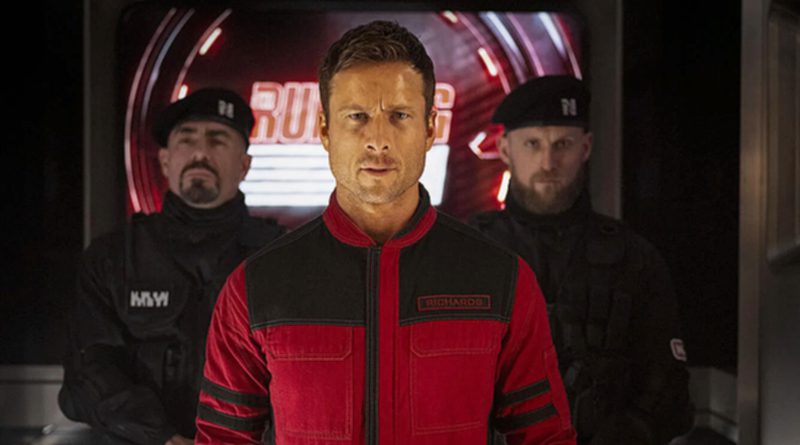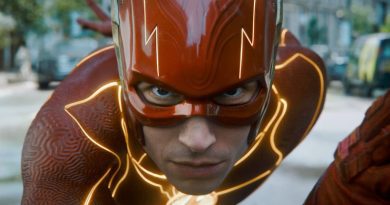The Running Man Review: Edgar Wright’s Most Expensive Movie to Date is Far From His Best, Despite Glen Powell Excelling in His Everyman Action Persona
Paul Michael Glaser’s version of Stephen King’s (under the pseudonym Richard Bachman) The Running Man novel arrived at a time when you could get away with not being faithful to the source material, and you built the movie around to fit into a specific star vehicle. Such a move wasn’t exactly foolproof, but it somehow worked for Schwarzenegger in the movie. Released in 1987, I always viewed The Running Man as one of his lesser movies during his prime era, even though subsequent re-watches every now and then renewed my perspective.
Sure, the Schwarzenegger version was a product of its era, but beneath all the violent B-movie action thrills and obligatory wisecracking one-liners, part of the movie’s enduring appeal remains as relevant as ever. This is especially true with the movie’s pitch-black, yet mean-spirited jab at reality television and even the precursor of how AI-like technology is used unethically to manipulate footage to boost the rating and viewership. The 80s came and gone, and remaking a movie like this inevitably requires plenty of culturally and thematically relevant updates and, above all, maintaining the faithfulness of its source material — something the 1987 version had mostly steered away from.
The good news is that Edgar Wright chooses to stick to the novel, even though he does so with a fair share of flaws. The Ben Richards that the audience who have grown accustomed to Schwarzenegger’s larger-than-life persona in the 1987 version, is finally course-corrected to fit the novel’s working-class everyman driven by desperation and poverty. Casting Glen Powell proves to be a right fit, displaying the personality traits of a distressed, ordinary person beneath his tough and rugged exterior, seen in his character as Ben Richards. He’s angry and desperate after losing his job, leaving him in a dire situation of providing for his wife (Jayme Lawson) and their ailing baby.
Despite his wife still working, the money they have is barely enough to cover their baby’s costly medical expenses. Since he can’t get a job, the only solution he has is to join one of the reality shows to make quick money. He ends up being selected for the titular ultimate reality show, despite showing no interest in it whatsoever, until the network producer Dan Killian (Josh Brolin) manages to convince him otherwise. And that is, a huge payout, more than enough for Ben and his family to escape poverty. He reluctantly agrees after signing the contract, and the game begins with Colman Domingo’s Bobby T having a field day playing the host of The Running Man.
The rules? Survive for 30 days straight to win the big cash prize without being found and killed, as the show will deploy a group of hunters led by Evan (an intimidating Lee Pace, whose face is entirely concealed in a mask). He’s on his own, and so are the other two contestants, Laughlin (Katy O’Brian) and Jansky (Martin Herlihy). For a while there, particularly in the first act, director and co-writer Edgar Wright does a good job establishing the gritty tone right from the get-go. The pace is energetic, just like the title itself.
Powell’s no-nonsense charisma keeps me engaged while watching the movie. He is certainly giving his all, running the gamut of emotions—anger, frustration, and determination to stay alive at all costs. He’s no typical action hero, but more of a man who relies on improvisation and survival instinct. And yet, the 133-minute runtime reveals a few glaring issues I find hard to ignore, beginning with its erratic pace, which could have used a tighter edit. The movie also grows repetitive by the time it reaches the protracted second act, even though it has its moments of action-movie thrills and levity.
The latter is especially true with Wright manages to lighten up in some scenes amidst the nature of its story. Fans of the director’s past works will likely enjoy the most during the later scene revolving around Michael Cera’s Elton Parrakis in his gleefully unhinged, scene-stealing supporting turn as the young rebel who helps Ben. The entire scene that pairs him with Powell’s Ben is easily the movie’s most memorable moment.
Pretty much everything else feels more like a transition for Wright running out of his comfort zone in making a movie as widely commercial as possible. While there’s nothing wrong with a director going for the mainstream, Wright’s biggest-budgeted movie to date — reportedly costing US$110 million — sees him sacrificing most of his unique directorial flair in favour of the been-there, done-that type of race-against-time dystopian action thriller mould. He did take a jab at the 1987 version while attempting to inject The Running Man with a few shades of Paul Verhoeven-like pitch-black satire — one of which includes The Kardashians-type reality television show — with mixed results.
The movie’s underlying familiar themes of the dark side of reality television, capitalism and media manipulation are nothing new, making me wish Wright and co-writer Michael Bacall would provide a fresh angle. The action is surprisingly a hit-or-miss, especially given Wright’s impressive technical prowess seen in Hot Fuzz and Baby Driver. It’s far from a great Edgar Wright movie that I’ve been hoping for, but The Running Man remains a fairly propulsive fun time watching it on the big screen.





